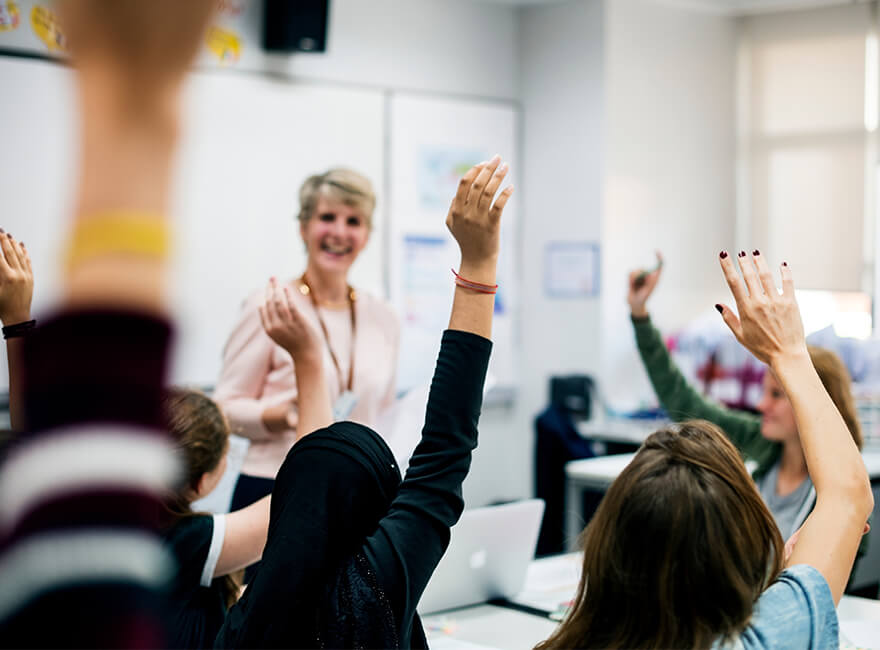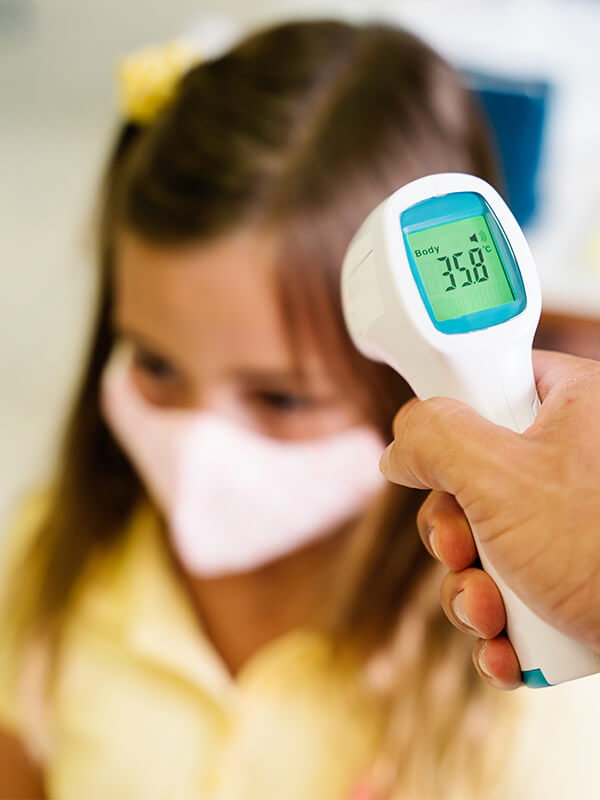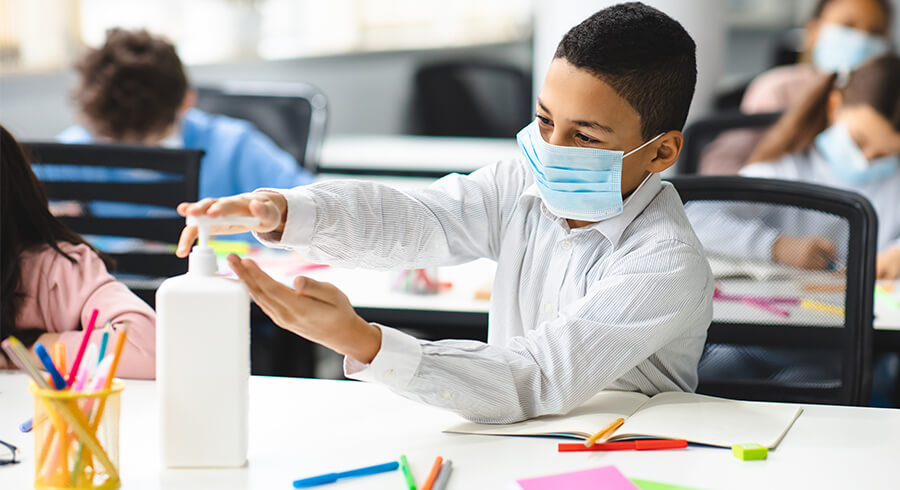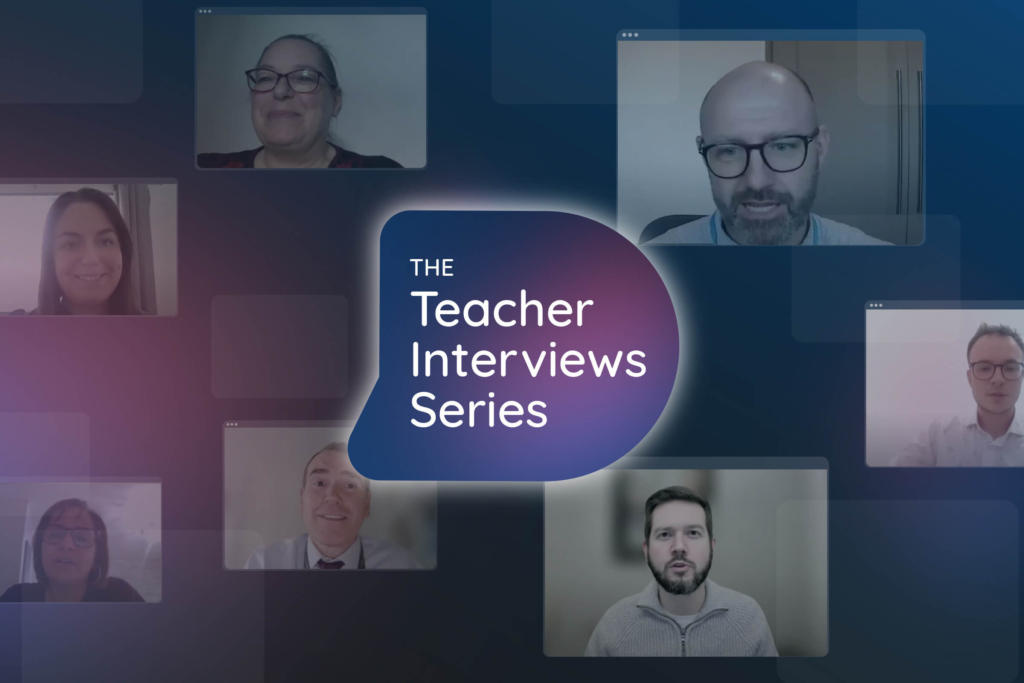


Schools Are Open: An update on what’s happening

This week most primary and secondary school pupils and staff across the UK have returned to school.
So I thought I’d help by giving you a detailed snapshot of how schools are currently operating and how they’re keeping everyone safe.
Buzz’s Top Tip: See if there’s anything you can help schools with and add it to your marketing plans.
After the government announced that schools would reopen in March 2021, they also provided updated guidance on how to keep pupils, teachers and staff safe.
It’s important to note, the government advised that there isn’t a one size fits all approach. Schools have the freedom to manage this how they see fit, as long as all safety measures are in line with the guidance. Plus, we’ve discovered a lot of schools can use the same processes they’d already adopted when they reopened in September 2020.
To shine a light on any marketing opportunities for education suppliers, I’ve dug a little deeper and collected all the information I think is beneficial to you from the guidelines and our 2021 schools surveys.
How teachers and school staff feel about returning to school
We asked 200 teachers and education staff across the UK how they feel about returning to school:
- 64% of teachers said they feel positive about the return to school.
- 57% of head teachers reported feeling positive or excited.
“I much prefer teaching students face-to-face. I enjoy the energy you get from having a class in front of you rather than working on a screen.
I also think that collaborative work is so much easier in a classroom despite the advances in technology.”

Understandably, 50% of teachers reported feeling nervous about Covid-19 rates rising now schools have reopened. However, we hope that, as more teachers become eligible for the vaccination over the coming months, we’ll start to see a more confident teaching community.
Schools Covid-19 safety measures – government guidance
Minimise contact
Primary and secondary schools need to reduce the number of pupils mixing. They can:
- Keep pupils separated into consistent class or year bubbles.
- Maintain social distancing in secondary schools.
- Limit the sharing of rooms and social spaces.
- Consider staggered break times, lunch times, start and finish times.
- Avoid large gatherings.
- Encourage pupils to not use public transport.
- Allocate specific toilet blocks for individual bubbles.
- Have their own frequently used equipment.
- Remove all unnecessary items from classrooms.
- Make use of all space, including outdoor space.
- Develop seating plans and ensure pupils do not sit facing each other.
For teachers and staff to easily deliver the timetable and specialist provision, they’re allowed to move across different classes and year groups. To keep safe, they should:
- Maintain social distancing at all times, including in shared staff spaces.
- Minimise the number of interactions or changes wherever possible.
- Encourage staff to not use public transport.
Testing
Primary schools pupils won’t be tested in school, but staff will continue to use at home tests twice a week
Secondary school pupils will have 3 initial tests at school, and will then be provided with home test kits for regular testing. Staff will use at home test kits twice a week.
Self-isolating
Primary and secondary school pupils, staff and other adults must not come into the school if:
- They have any Covid-19 symptoms.
- A member of their household or bubble has Covid-19 symptoms.
- They’re required to quarantine having recently visited countries outside the Common Travel Area.
- They’ve had a positive test.
- They’ve been in close contact with someone who has tested positive.
Schools must keep in contact with any child who’s self-isolating and considered vulnerable.
If a staff member or child in a school bubble tests positive, then the whole bubble will be asked to
self-isolate and will return to home-learning for the isolation period.
If schools have 2 or more confirmed cases within 14 days, or an overall rise in Covid related absences, this would be considered as an outbreak.
Face masks
Primary schools pupils don’t need to wear face masks, and staff and visitors should wear face coverings where social distancing can’t be maintained.
In secondary schools:
- Pupils and staff should wear face masks when moving around, where social distancing can’t be maintained.
- Face masks don’t need to be worn by pupils when outdoors.
- Pupils aged 11 and over must wear a face covering when travelling on public or dedicated school transport to school.
- In Northern Ireland, face coverings must be worn in staff rooms, during adult-to-adult meetings lasting more than 15 minutes and by adults visiting the school site.
PPE
Most primary and secondary school staff won’t require PPE beyond what they would normally need for their work.
Additional PPE is only required when:
- A pupil becomes ill with Covid-19 symptoms, and only then if a 2 metre distance cannot be maintained.
- Performing aerosol generating procedures (AGPs).
- When working with children and young people who cough, spit or vomit but do not have Covid-19.
This is what teachers have told us:
“We’re doing lateral flow tests twice a week, spit testing weekly, temperatures will be taken daily, bubbles won’t mix and there are excellent Covid-19 risk assessments in place.” Key Stage 3 Teacher, All-Through School
“I can’t wait to finish online learning, the school has taken a practical and sensible approach to safety and the virus and I want to see the students back in school.” Secondary School Teacher
“We have good Covid -19 arrangements in place. We want and need children back in the classroom.” Primary School Teacher

Hygiene – government guidance
Hand washing
Primary and secondary school staff and pupils must clean their hands regularly, including:
- When they arrive at the school.
- When they return from breaks.
- When they change rooms.
- Before and after eating.
- After using the toilet.
Respiratory hygiene
The ‘catch it, bin it, kill it’ approach continues to be very important. To make sure this is enforced, schools need to make sure there are enough tissues and bins available.
To improve the air quality in shared spaces schools should consider a variety of measures including mechanical ventilation systems, and natural ventilation such as opening windows and internal and external doors where necessary.
Cleaning
Schools need to develop enhanced cleaning schedules. It should include more frequent cleaning of shared rooms and areas, and regularly touched surfaces.
Classroom based resources can be used and shared within a bubble, but must be cleaned regularly.
Resources that are shared between classes or bubbles:
- Should be cleaned frequently.
- Cleaned before being moved between bubbles.
- Or allowed to be left unused for a period of 48 hours (72 hours for plastics).
Outdoor playground equipment should be frequently cleaned.
Pupils should limit the amount of equipment they bring into school, including essentials such as lunch boxes, hats and coats, books, stationery and mobile phones.
Our 2021 schools survey has revealed:
- Hand sanitiser will be made widely available around schools.
- Windows and doors will be always left open in many schools.

Additional support – government guidance
Mental health
To support any pupils who are feeling anxious, stressed or are experiencing low mood as a result of the pandemic, staff need to reaffirm that these emotions are a normal and valid response.
Staff are encouraged to use pastoral and extracurricular activities to:
- Support the rebuilding of friendships and social engagement.
- Address and equip pupils to respond to issues linked to Covid-19.
- Support pupils with approaches to improving their physical and mental wellbeing.
School trips
School trips are on hold for the time being but will be reviewed as restrictions continue to ease.
Extracurricular activities
- All before and after school activities and clubs can resume.
- Performances can take place without an audience.
- Playing instruments and singing in groups should take place outdoors wherever possible. If indoors, schools should consider limiting the numbers in relation to the size of the space.
- Pupils should be positioned back-to-back or side-to-side when playing or singing.
- Avoiding sharing instruments and equipment.
- If instruments and equipment must be shared, disinfect regularly and always between users.
This is what teachers have told us:
“I feel I can do my job best in supporting the needs both mentally and academically of the children when teaching face-to-face.” Primary School Teacher
“Virtual teaching has worked as well as can be expected and has certainly improved as our knowledge has increased. However, I am tired of looking at a screen all day, it has definitely had an effect on both my physical and mental health and I cannot wait for it to be over!” Secondary School Teacher


My top tips for education suppliers:
- Support schools in navigating these guidelines.
- Let schools know how you can help them put suitable measures in place.
- Continue to offer your industry expertise and advice to schools in your area of knowledge.
Contact us today and together we can plan your next marketing to schools campaign. Give us a call on 01257 460036 or email info@buzz-education.com.
All the information provided has been sourced from the Buzz Education 2021 schools surveys and official government documentation: England, Northern Ireland, Scotland, Wales.





